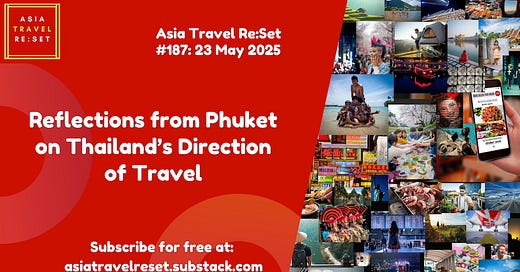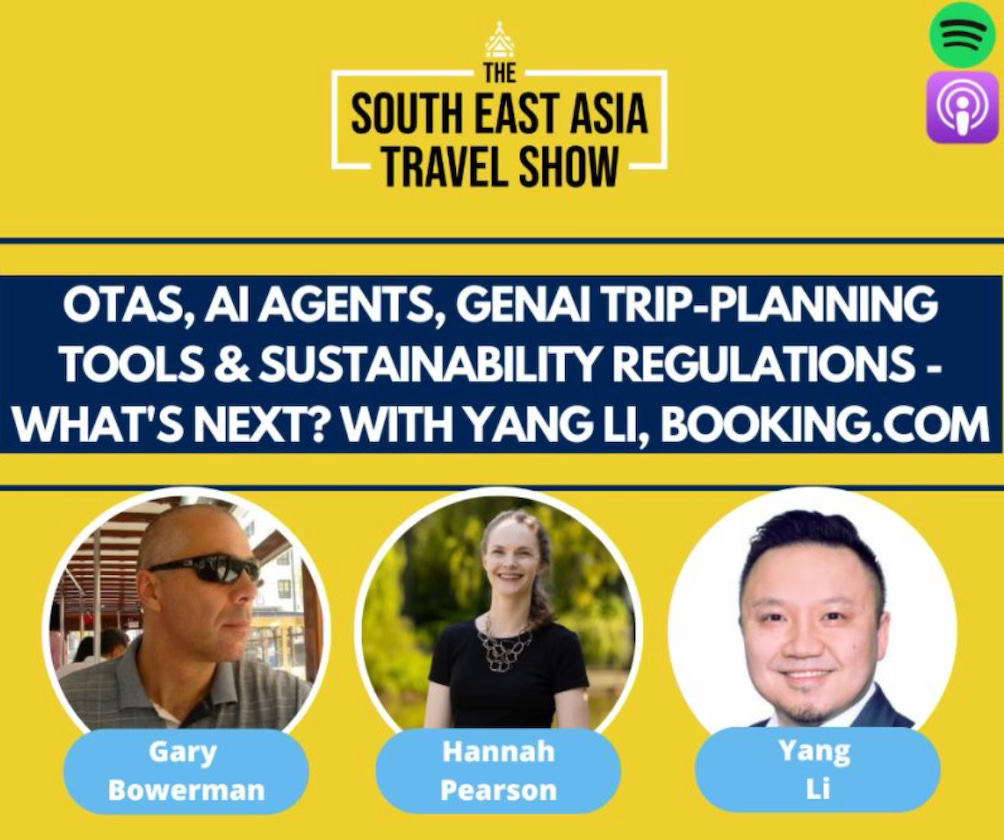Issue #187: Reflections from Phuket on Thailand's Direction of Travel
India and Russia, as well as China, are reshaping seasonal travel patterns in Phuket.
Welcome to Issue 187 of Asia Travel Re:Set.
Almost 4 years ago, Phuket became the epicentre of South East Asia’s travel reboot.
For 16 months, region-wide Covid border closures had curtailed travel activity, and created a horrible mess for supply chains, trade flows, stock markets and SMEs.
Then, on 1 July 2021, Thailand introduced the Phuket Sandbox. This was the region’s first - albeit heavily restricted - attempt to reopen to tourism.
On that date, I noted in an interview with CNN, that “At the moment, the whole travel ecosystem is trying to work out what happens next.”
In many ways, it still is.
As I’ve said recently on various conference stages, it’s unfashionable to refer to the pandemic when discussing travel economies. But in Asia, the effects - financial, physical and psychological - of those 2-3-year border closures remain salient.
The stated near-term goal for Thailand was to recover the 10.99 million Chinese arrivals from 2019. But the Chinese travel market continues to evolve and fragment, and the viability of matching that total remains in question.
As Thailand struggles to formulate the next phase of its post-Covid recovery, I returned to Phuket - which has strong historic cultural ties with China, and where 2 other source markets are increasingly influential.
Thanks for checking in…
Reflections from Phuket on Thailand's Direction of Travel
Yekaterinburg. Hyderabad. Irkutsk. Bengaluru. Krasnoyarsk. Kolkata. Novosibirsk.
Those were perhaps not the visitor source locations that sprung immediately to mind when Thailand launched the Phuket Sandbox to revive international tourism.
Today, they illustrate how travel flows are changing in leading ASEAN destinations.
This week, Indian and Russian cities were prominent on Phuket Airport’s Departures board alongside familiar names, like Singapore, Kuala Lumpur and Bangkok.
Chengdu and Guangzhou were the only Chinese cities up in lights while I was there - highlighting that the period between the May mini Golden Week and the summer school holidays is comparatively quiet for Chinese outbound travel.
In addition, as Leon Li of Fliggy noted this week in a seminar hosted by Dragon Trail International, Chinese bookings on its platform to Thailand are down “more than 30%” year on year so far in 2025.
No similar issues for India. The summer school holiday season has begun - and Phuket is a hot-ticket destination. Last weekend, Phuket Airport welcomed a sizeable influx of families and couples arriving on direct flights from cities across India.
May - the start of Green Season - is my favourite time to visit Phuket. The rains have begun, hillsides are verdant, beaches, towns and hotels are quiet. For Thailand as a whole and for Phuket specifically, only September recorded fewer monthly visitors during 2024. The island is bedding down for the annual tourism slowdown.
Several F&B outlets in Kamala Beach were closed, enabling their owners to take an off-season break - and hotels and restaurants were very quiet.
Watching a mesmerising sunset in Mai Khao, we were joined only by 3 Indian couples and a Korean family on our long, flat strip of empty beach. As the burning oranges and purples radiated across the sky, we were the only customers at a beachfront bar.
It is for these seasonal reasons that the Tourism Authority of Thailand is currently turning part of its attentions to promoting domestic tourism.
Thailand’s Top 6 Airports: Passenger Totals, January-April 2025
Source: Airports of Thailand
Changing - and seasonally dynamic - patterns of travel to Phuket are worth watching, especially given Thailand’s -1.75% decline in visitor arrivals from 1 January-18 May.
Thailand’s largest, and most-visited, island officially attracts between one-quarter and one-third of annual visitors to the country. This figure fluctuates across the calendar when factoring in visitors who travel to Phuket having arrived elsewhere in Thailand.
In Q1 of 2025, Phuket welcomed 3.89 million domestic and inbound visitors. International passenger traffic at Phuket Airport (see above) in the first 4 months of the year was up 12.5%, double the 6.1% average of Thailand’s top 6 airports. International aircraft movements increased almost 15% year on year.
Substantial numbers of travellers to Thailand from 3 of its top 5 visitor markets so far in 2025 - China (1.82 million), Russia (0.93m) and India (0.88m) - tend to favour Phuket. In 2024, Russia (the only inbound market above 1 million), China and India - in that order - collectively accounted for 29% of international arrivals to Phuket.
Across 2025, we are likely to see a further reconfiguring of visitor flows, flight paths and nationality mixes in Phuket’s arrivals lines and departures lounge. Meantime, a brighter light will be shone on the readiness of the island’s tourism venues, hotels, resorts and restaurants to accommodate guests with different needs and preferences.
As one Indian guest remarked to a relative while approaching the breakfast buffet at a resort in Mai Khao: “Please tell me they aren’t going to make us eat only fruits.”
OTAs, AI agents, GenAI. Sustainability Regulations. What's Next in APAC?
AI and sustainability are hotly debated topics in APAC travel. But how will (or won't) new regulations shape interactions between travellers, suppliers, booking apps and governments?
On The South East Asia Travel Show, we are joined by Yang Li, Head of Public Affairs, Asia Pacific, at Booking.com, to discuss the evolving outlook for OTAs, sustainability and AI policy development.
⏩ Which ASEAN and APAC countries are developing legal frameworks around sustainability?
⏩ How prepared are businesses region-wide for the EU Greenwashing Claims Directive?
⏩ Did the results of Booking.com’s 2025 Sustainability Report differ from 2024?
⏩ What are 'closed loop' AI trip-planning tools, and how are travellers using them?
⏩ How will the interface between OTAs and AI agents shape up?
⏩ And will Asian governments continue their light touch approach to AI regulation, or are new legal frameworks on the horizon?
Click on the live link below to listen to OTAs, AI Agents, GenAI Trip-Planning Tools & Sustainability Regulations - What’s Next?, with Yang Li, Booking,com
Or search for The South East Asia Travel Show on any podcast app.
And, that’s a wrap for Issue 187.
Asia Travel Re:Set will return next Sunday. Meantime, find me on LinkedIn.
Happy travels,
Gary








